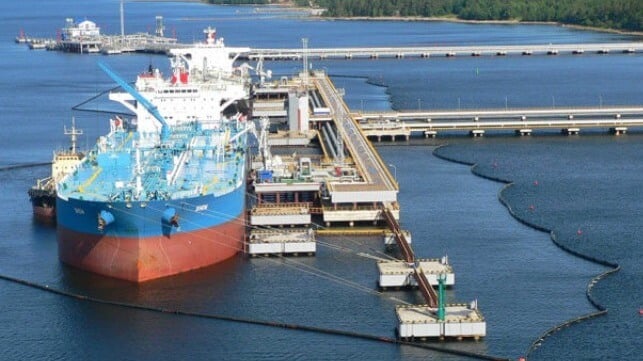Report: Ukraine's Port Strikes May Force Russia to Curtail Oil Output

After a series of damaging attacks by Ukrainian drones, Russia's oil refining and export infrastructure may not have the capacity to handle - or even store - the full output of Russian oil wells, according to new reports.
Transneft, the dominant Russian pipeline operator, has put limits on the quantity of storage that producers can use in its pipeline network, Reuters reports. The midstream operator has warned oil companies that if the damage continues and demand drops at the receiving end of the pipeline network, it may have to accept less crude, several industry insiders told the news agency. (Transneft vehemently denied the report and protested that this "fake news" could damage its image.)
If true, hitting the limits of pipeline transit and storage capacity would mean that Russia would be forced to curtail production - meaning shutting-in wells, a process that can reduce a formation's ability to produce oil when restarted. A forced cut in pumping is among Ukraine's top strategic objectives, because Russia funds its ongoing war in large part with oil export revenue.
The reported restrictions are a result of a concerted campaign of long-distance mass drone attacks. Ukraine has targeted Russia's largest refineries, and some have been hit repeatedly since the start of 2025. Drone operators hit at least 10 Russian refineries since the start of August alone. In recent weeks, Ukrainian intelligence services have broadened the scope of their target list to include Russia's two Baltic loading ports, Primorsk and Ust-Luga, causing limited damage at both facilities.
The impact of any one strike is transitory, as Russian energy companies are capable of making repairs. But the cumulative effect has taken as much as 20 percent of Russia's refining infrastructure offline at a time, and the attacks continue at a rapid pace. Strikes on loading terminals have a multiplier effect: the terminals are a critical backup destination for barrels that have no domestic takers - and there are many such barrels because of the refinery attacks.
The strike at Primorsk damaged two sanctioned tankers, the Cai Yun and the Kusto, as well as pumping equipment at the facility. Ukrainian analysts have estimated that the damage at Primorsk could reduce its loading capacity by half; it is not fully offline, however, and has already restarted at least some of its waterside operations at a slower pace.
Russia produces nine percent of the world's crude oil, and the prospect of a slowdown could impact oil prices. So far the market is unperturbed: crude prices are up 3.5 percent over the past month, averaging about $68 rather than $66.
